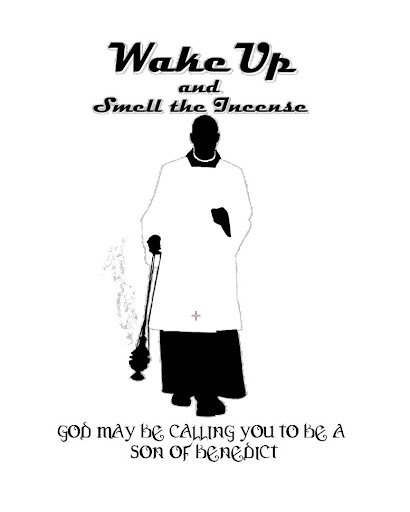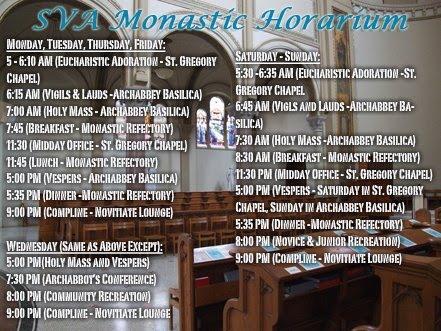300 Fraser Purchase Road. Latrobe, PA 15650 ( Vocation Office 724.532.6655 )
September 23, 2014
10 Hallmarks of Benedictine Education (Part 9)
At Saint Vincent Archabbey many of our monks are involved in our College Apostolate. Some serve as Professors in departments such as Theology, Philosophy, Mathematics, English, Science or Business, while others work in the Library or Campus Ministry. Needless to say, our Benedictine Heritage influences the way that we educate our students as a WHOLE human person, Body, Mind, and Soul.
Thus, this series of posts will focus on the 10 Hallmarks of a Benedictine Education.
9. Hospitality: call to openness
The practice of listening and humility in a Benedictine monastery enables a generous hospitality to friends and strangers. Benedict urges that the weaknesses of all should be supported with the greatest patience (RB 72.5). Particular attention is to be given to those who are weak, poor or marginalized because, as Benedict says of the guest, Christ is found especially in them. Every
attempt is to be made to extend a gracious and respectful welcome to these persons as the sisters
and brothers they truly are.
(Click "Read More" to continue reading this post)
September 15, 2014
10 Hallmarks of Benedictine Education (Part 8)
At Saint Vincent Archabbey many of our monks are involved in our College Apostolate. Some serve as Professors in departments such as Theology, Philosophy, Mathematics, English, Science or Business, while others work in the Library or Campus Ministry. Needless to say, our Benedictine Heritage influences the way that we educate our students as a WHOLE human person, Body, Mind, and Soul.
Thus, this series of posts will focus on the 10 Hallmarks of a Benedictine Education.
8. Stewardship: respect for the beauty and goodness of creation as a sacrament of God
At its core the Rule seeks to foster a fundamental reverence toward the creation that God has
made. Benedict exhorts his followers to regard all the tools and goods of the monastery as the
sacred vessels of the altar (RB 31.10). Benedictine monastics do not simply use up what has been
given to them, nor do they aim at poverty. Instead, they prize good stewardship, the wise and
moderate use of material things for the good of all, both present and future. This appreciation of
the good use of material things leads to a sacramental stance toward all creation and the
cultivation of beauty as modes of experiencing the presence of God.
(Click "Read More" to continue reading this post)
September 7, 2014
10 Hallmarks of Benedictine Education (Part 7)
At Saint Vincent Archabbey many of our monks are involved in our College Apostolate. Some serve as Professors in departments such as Theology, Philosophy, Mathematics, English, Science or Business, while others work in the Library or Campus Ministry. Needless to say, our Benedictine Heritage influences the way that we educate our students as a WHOLE human person, Body, Mind, and Soul.
Thus, this series of posts will focus on the 10 Hallmarks of a Benedictine Education.
7. Humility: acceptance of the demand for realism and accountability
Humility is Benedict's word for wisdom. He begins his extended description of the twelve degrees of
humility with awe at the abiding presence of God and ends with the love that casts out fear (RB 7).
Benedictine humility accepts the reality of the day-to-day world - nature, events, other people -
and our true place within it. This practical realism demands honesty and accountability of everyone
in a Benedictine house. Each monastic seeks to acknowledge his or her faults and weaknesses.
Each strives to recognize their own gifts and the gifts of others with gratitude, seeking to contribute
as much as possible to the good of the whole and accepting the care of others.
(Click "Read More" to continue reading this post)
September 3, 2014
Family Fosters Vocations
Apostolic Exhortation, Pastores Dabo Vobis, 1992
Labels:
Discernment Advice,
Pope John Paul II,
Priesthood
Subscribe to:
Posts (Atom)
O.S.B. Vocation Awareness

.jpg)
.jpg)
.jpg)
.jpg)
.jpg)
.jpg)
